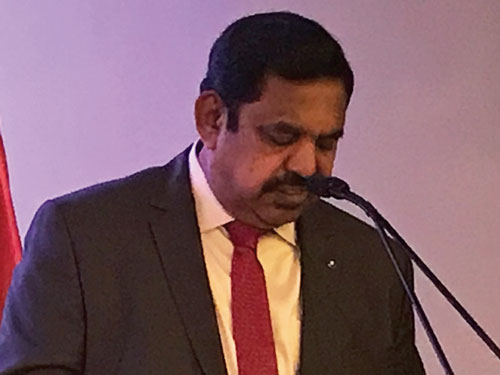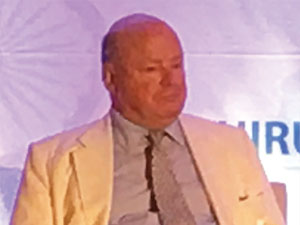Infrastructure Development
Other Investment
The chief minister of Tamil Nadu in southern India, accompanied by some ministers and high-ranking officials from the state, visited New York, San Francisco, San Jose and Los Angeles, from September 3 to 7, to attract business and investments to Tamil Nadu which is focusing on infrastructure development to propel the state’s economic growth trajectory.
Businesspeople and potential investors gathered in New York to listen to the pitch made by Chief Minister Thiru Edappadi K. Palaniswami and his top officials in the presence of a number of American businesspeople and officials, including former U.S. ambassador to India, Frank Wisner.
Some participants told American Journal of Transportation at the New York roadshow that Tamil Nadu had discerned opportunities to attract investments from U.S. companies following their withdrawal from China. The New York roadshow – an investment seminar – jointly hosted by the Indian Consulate General in New York and the U.S.-India Strategic Partnership Forum (USISPF), highlighted Tamil Nadu’s investment policies and initiatives to attract U.S. businesses to invest and provide technology in the state.
“A conducive business environment and various incentives like tax refunds, capital subsidies, highly skilled manpower, power supply, state of the art infrastructure facilities and reputation for efficiency have made Tamil Nadu investors’ choice,” Palaniswami said.

Earlier in the year, Tamil Nadu had organized a mammoth Global Investors’ Meet in Chennai which, Palaniswami said, resulted in over 300 MoUs with investment commitments estimated around US$ 43 billion.
Initiatives
Palaniswami recalled that Tamil Nadu had taken several initiatives to further promote sectors like automobiles, e-vehicles, electronic hardware and software, food processing and medical devices, adding that the state government was also taking initiatives to promote aerospace and defense manufacturing industries; for this purpose, over 8,000 acres of land would be available across the state at various industry parks.
Palaniswami said that his predecessor, the late Chief Minister J. Jayalalithaa had set a “vision for developing Tamil Nadu into the numero uno state in India”.
“I assure you my state will always stand by you and provide you with the best possible investment experience,” he emphasized. The state was also offering a package of incentives, including goods and service tax refund, single window system, etc.
India’s Consul General in New York, Sandeep Chakravorty, a speaker at the investment seminar, highlighted “opportunities for India and states like Tamil Nadu” resulting from the current geo-political scenario and developments in global trade.
“I am specifically referring to China,” Chakravorty said. He discerned lot of interest among U.S. companies to relocate their manufacturing and businesses to India. “The Government of India and Tamil Nadu (are) rolling out the red carpet to invite investors who are wanting to relocate, part of their business or their whole business into India,” the consul general said, adding that “Tamil Nadu is the state to look at”.
In Palaniswami’s presence In New York, 15 MoUs were signed between Tamil Nadu and US firms in sectors such as financial services, IT solutions, pharma, chemicals, health, LNG, petro-chemicals and cyber security.
N. Muruganandam, the Principal Secretary in Tamil Nadu’s Industries Department, addressing the investment forum, maintained that Tamil Nadu’s GDP is the second largest in India; the state had consistently posted a growth rate of around 8%. Tamil Nadu is India’s third largest exporting state, with over 60 of the Fortune 500 companies maintaining a base here.
Other Investment
The major sectors for investment are automobile and wind energy, IT, electronic hardware, chemical and fertilizers, renewable energy, while aerospace and defense are the new emerging growth areas in the state. The Government of India had announced two defense industrial corridors; one of them is in Tamil Nadu.
“We have a Vision 2023 plan, under which about 57.4 billion dollars is being invested in urban infrastructure and we propose to expand the power capacity to around 55 GW by 2023,” Muruganandam said. Katie Hayes, head of Government and Corporate Affairs at Caterpillar (USA), and James Rowland, manager of International Government Relations, at Ford – both companies have strong presence in Tamil Nadu - also spoke at the New York event.
Mukesh Aghi, the USISPF President and CEO, referred to the ongoing trade friction between the U.S. and China which had built itself up as the manufacturing hub of the global industry. Aghi revealed that “we have seen roughly 200 US companies asking us what do we have to do to come to India”.
Former US Ambassador to India Frank Wisner recommended that for India to attract additional foreign investment, the Indian government should produce laws that ensure easy employment of labor, land acquisition and reliability of tax systems.
Wisner called for providing a “welcoming framework” for foreign investors, by helping the latter find land, get clearances and have educational and health infrastructure. “All this will ensure that Tamil Nadu is the recipient of not just U.S. investment but global investment as well, including from China and elsewhere,” the former U.S. ambassador said.
Tamil Nadu’s Chief Secretary K Shanmugam highlighted the state government’s policies of promoting investments, pointing out that the state had a line-up of a “large number of infrastructure projects in urban development, urban transportation,” as well as a FINTECH city, which would benefit U.S.-based FINTECH companies.

Tamil Nadu is planning to build 2000 km of 6-8 lane expressways, 5000 km of 4 lane highways, and all highways being at least double lanes and with paved shoulders. The capacity of ports in Tamil Nadu is to be incrementally increased to over 150 million tonnes per annum, including 15 million TEUs of container capacity. All urban points, with population exceeding 500,000, will be connected with high speed rail corridors for both freight and passenger traffic. Airport capacity for passengers will also be increased to handling 80 million passengers per annum across all airports in the state, with Chennai alone accounting for half the capacity
Infrastructure development will be financed from a mix of public and private funding, with more than two-thirds of funding sourced from the private sector.
Infrastructure development includes establishment of three large green field multi-cargo non-major ports with incremental aggregate capacity of 150 million tonnes to handle dry bulk, imported/domestic coal for power generation, liquid cargo, and containerized cargo. A freight corridor connecting Chennai and Thoothukudi is on the cards as also a Metro/Mono rail for two cities (other than Chennai).


